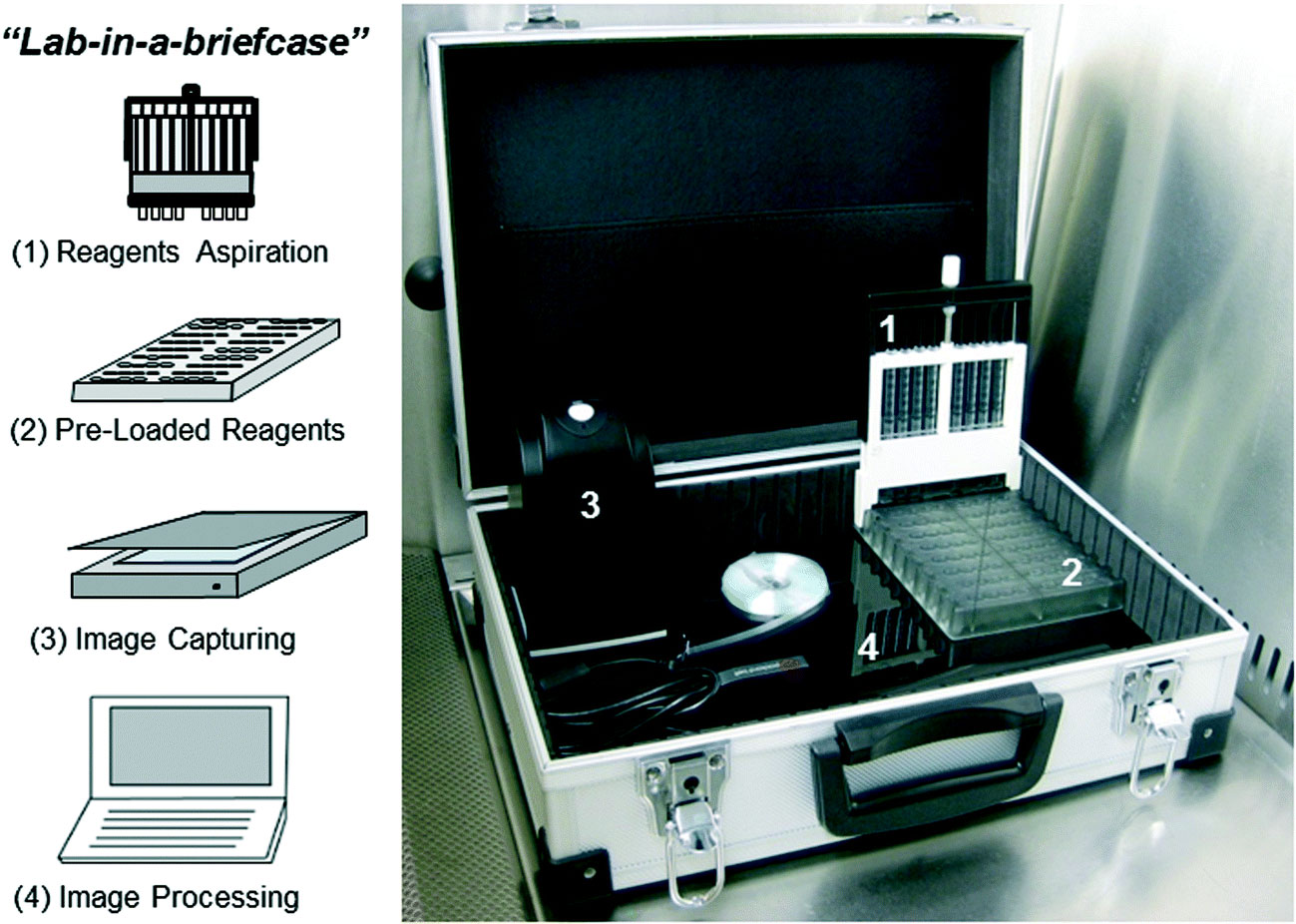First Lab-in-a-Briefcase to Boost Global Early Diagnosis of Cancer
By LabMedica International staff writers
Posted on 18 Nov 2015
To help boost early cancer detection rates worldwide, scientists have developed an all-in-one portable mini-laboratory for point-of-care cancer screening, rapid detection, and monitoring. The prototype successfully tested for prostate cancer, and can operate at even at high temperatures often found in remote areas without air-conditioned clinics.Posted on 18 Nov 2015
An estimated 70% of the world’s cancer deaths occur in Africa, Asia, and Central and South America. The lab-in-a-briefcase, believed to be a first-of-its-kind, was developed by a team from Loughborough University (Leicestershire, UK) and Capillary Film Technology, Ltd. (West Sussex,UK), led by Dr. Nuno Reis, lecturer in chemical engineering, Loughborough University.

Image: The 4 main components of the newly developed “lab-in-a-briefcase.” (1) Disposable multiple syringe aspirator (MSA) devices, each of which can perform 10 replicate ELISA tests on each of the 8 samples. (2) Customized microwell plates preloaded with reagents that interface with the MSA. (3) Portable USB-powered film scanner for colorimetric signal quantification. (4) Portable computer for real-time data analysis (Photo courtesy of Barbosa AI et al., 2015, and the journal Lab on a Chip.)
One of the system’s remarkable features is the use whole blood without the need for sample preparation, which has been a challenging task for settings outside of a central laboratory. This also provides improved safety by minimizing the handling of blood samples from patients that may have infectious diseases.
The compact system, a complete miniaturized ELISA platform, comprises of 4 main components: a manually driven multi-syringe aspirator capable of performing up to 80 simultaneous tests from whole blood samples; microwell ELISA plates pre-loaded with assay reagents; a portable USB-powered film scanner to image test-strips; and a portable computer for real-time data analysis.
The easy-to-use, semi-automated system requires only one operator with minimal training to conduct the test within 15 minutes – with no need for additional equipment or instruments.
A new affordable, disposable microfluidic test-strip—comprising of tiny capillary tubes about the width of a human hair—is used specifically for quick measurement of different cancer biomarkers in a whole blood sample. This technology, which operates like a pregnancy test, has already been used successfully in a separate study led by Dr. Reis that detected prostate cancer with the help of a smartphone camera. The new, lab-in-a-briefcase study also focused on detecting prostate cancer (by testing for the PSA [prostate-specific antigen] biomarker); however the microfluidic test-strip is versatile enough to measure several cancer biomarkers simultaneously from a single sample.
“Our lab-in-a-briefcase is both inexpensive and simple to use; it means that high-precision diagnostic kits, complete with clinical laboratory equipment, can be made accessible to remote populations, and this is what makes it a truly life-changing concept for the screening and monitoring of different types of cancer,” said
Dr. Reis, “This portable lab can really make a difference, boosting levels of cancer detection in developing countries where ordinarily people would not have such easy access to early diagnostics. I envisage that our lab-in-a-briefcase could also be developed further in the future to allow for rapid testing of infectious diseases and allergens.”
The study, by Barbosa AI et al, was published in June, 2015, in the journal Lab on a Chip.
Related Links:
Loughborough University
Capillary Film Technology














